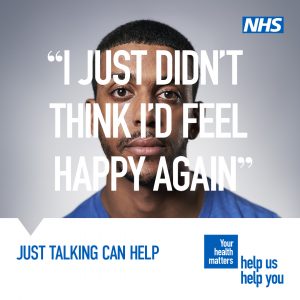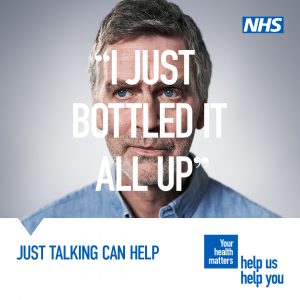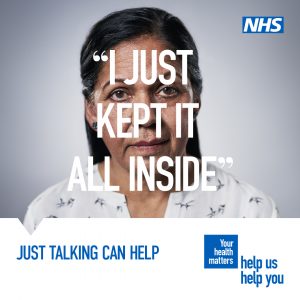NHS Urges People in the Midlands with Mental Health Worries to Seek Help
People in the Midlands with mental health worries are being urged to seek help straight away by talking to their GP or self-referring online for talking therapies through www.nhs.uk
Although mental health services have been running throughout the pandemic there was a marked dip in referrals despite evidence suggesting that coronavirus is making problems more common.
In April 2020 only 57,814 referrals were made nationally compared to  133,191 in April 2019.
133,191 in April 2019.
The latest figures from July show that referrals are recovering but are still down by 11% compared to last year.
A new NHS campaign – Help Us, Help You – will encourage anyone suffering from anxiety, depression or other issues to come forward for assessment and treatment.
NHS talking therapies, also known as Improving Access to Psychological Therapies (IAPT), is a confidential service run by fully trained experts.
Giles Tinsley, Programme Director for Mental Health at NHS England and NHS Improvement in the Midlands, said: “The NHS has been and continues to be here for people’s mental health in the Midlands. Patients say that COVID and lockdown can have an impact on their mental health and it has never been more important to seek help. We would encourage people to come forward for mental health care.
“People should not be embarrassed. Whether you are a new mum, an older person or struggling with work, please speak to your GP or self-refer online so we can get you the mental health support you need. No matter what age you are, these therapies help and are effective and we want you to come forward. The Midlands has fantastic provision of IAPT services, staffed by committed and highly trained staff who can work with people from all our communities to get the help they need.”
Some people have experienced mental health issues for the first time during the pandemic and lockdown while others have seen them return.
Common anxiety problems include (but are not restricted to) panic attacks, social anxiety, obsessive-compulsive problems, gene ralised anxiety/worry, and post-traumatic stress disorder.
ralised anxiety/worry, and post-traumatic stress disorder.
Emerging evidence suggests they are increasing due to the COVID-19 pandemic.
The Office of National Statistics (ONS) reported that almost one in five adults were likely to be experiencing some form of depression during the pandemic and almost one in eight developed moderate to severe depressive symptoms.
The ONS also found a marked increase in anxiety at the beginning of lockdown with almost half (49.6%) of people reporting high anxiety.
Not all those people who are feeling more anxious through the pandemic will go on to need professional support, but for those that do the NHS is here to help with talking therapies.
Professor David Clark, National Clinical and Informatics Advisor for the IAPT programme, said: “Talking therapies have been available through the NHS since 2008 and our programme is recognised worldwide for its scale, quality standards and effectiveness”.
“IAPT has transformed the treatment of adult anxiety disorders and depression since it was launched and is now being copied in other countries. The services have seen more than one million people in the last year.”
“COVID-19 has impacted us all in different ways and our mental health is just as important as our physical health. Talking therapies for anxiety and depression have been available throughout the pandemic and our services continue to be open to everyone who feels they might benefit from the invaluable help that psychological therapies can provide.”
The service has been fully running throughout the pandemic with almost 95% of talking therapies delivered remotely from July 2020 through a digital platform or over the phone, allowing people to stay in contact and get support more flexibly and comfortably. Face to face appointments are also still available, and services have implemented new measures to limit infection risks.
Talking therapies are available to all adults in England and you will receive confidential support tailored to you. For those whose first language is not English, talking therapies can be delivered in your chosen language through multi-lingual therapists or through confidential translators.
Paul Farmer, Chief Executive of Mind, said: “From illness or bereavement, to loneliness due to lockdown, or concerns about job security and debt – Coronavirus has had a huge impact on the mental health of the nation. Mind’s research with 16,000 people showed that despite greater prevalence of mental health problems, people were less likely to ask for help because of being worried that their problems aren’t serious enough, they are concerned about placing greater pressure on the NHS, or that they might contract Coronavirus.
“The earlier people can receive support for their mental health, the more likely they are to benefit from treatment such as talking therapies. As we deal with the winter and the second wave, it’s more important than ever that people are aware of the support available to them and feel confident about seeking help. It’s also crucial that services continue to adapt to make sure that nobody falls through the gaps, for example, making sure people who need support over the phone or face to face are able to access it.”
Minister for Mental Health and Suicide Prevention Nadine Dorries said: “The last few months have been challenging for many of us, especially for those with pre-existing mental health issues, and the NHS and Mental Health Services have remained open to support those who need it.
“Talking therapies can be highly effective in helping people who are experiencing anxiety and depression, and I encourage anyone who is struggling to come forward to get the support they need. Do not suffer in silence, speak to your GP or self-refer online to access support available.”
The NHS is here to help. To find out more about talking therapies, you can visit the NHS website.
